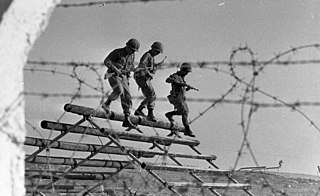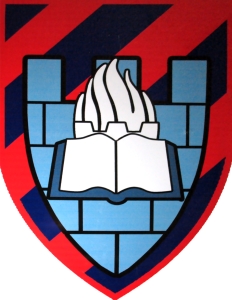Related Research Articles
Military justice is the legal system that governs the conduct of the active-duty personnel of the armed forces of a country. In some nation-states, civil law and military law are distinct bodies of law, which respectively govern the conduct of civil society and the conduct of the armed forces; each body of law has specific judicial procedures to enforce the law. Among the legal questions unique to a system of military justice are the practical preservation of good order and discipline, command responsibility, the legality of orders, war-time observation of the code of conduct, and matters of legal precedence concerning civil or military jurisdiction over the civil offenses and the criminal offenses committed by active-duty military personnel.

The United States Disciplinary Barracks (USDB) colloquially known as Leavenworth, is a military correctional facility located on Fort Leavenworth, a United States Army post in Kansas.

During the early stages of the Iraq War, members of the United States Army and the CIA committed a series of human rights violations and war crimes against detainees in the Abu Ghraib prison in Iraq, including physical and sexual abuse, torture, rape and the killing of Manadel al-Jamadi. The abuses came to public attention with the publication of photographs of the abuse by CBS News in April 2004. The incidents caused shock and outrage, receiving widespread condemnation within the United States and internationally.
Camp Cropper was a holding facility for security detainees operated by the United States Army near Baghdad International Airport in Iraq. The facility was initially operated as a high-value detention site (HVD), but has since been expanded increasing its capacity from 163 to 2,000 detainees. Former Iraqi President Saddam Hussein was held there prior to his execution. Mr. Hussein was held at a nearby location outside the Camp Cropper complex. He was isolated from the former Ba'ath Party and subsequent HVT’s held at the main Cropper facility.
A military prison is a prison operated by a military. Military prisons are used variously to house prisoners of war, unlawful combatants, those whose freedom is deemed a national security risk by the military or national authorities, and members of the military found guilty of a serious crime. There are two types: penal and confinement-oriented, where captured enemy combatants are confined for military reasons until hostilities cease. Most militaries have some sort of military police unit operating at the divisional level or below to perform many of the same functions as civilian police, from traffic-control to the arrest of violent offenders and the supervision of detainees and prisoners of war.

The judicial system of Israel consists of secular courts and religious courts. The law courts constitute a separate and independent unit of Israel's Ministry of Justice. The system is headed by the President of the Supreme Court and the Minister of Justice.

The Military Police Corps of the Israel Defense Forces (Hebrew: חֵיל הַמִּשְׁטָרָה הַצְּבָאִית, Chayal HaMishtara HaTzva'it, commonly called "Mem Tzadik" or "Mem Tzadi", is the Israeli military police and provost. The military police serves the Manpower Directorate during peacetime, and the Technological and Logistics Directorate during war.

Tironut is the Hebrew term for the recruit training of the Israel Defense Forces (IDF).

The Israel Prison Service, known in Israel by its acronym Shabas or IPS in English, is the state agency responsible for overseeing prisons in Israel. It is under the jurisdiction of the Ministry of Public Security. In 2014, its workforce was 8,800.

The Military Advocate General is responsible for implementing the rule of law within the Israel Defense Forces. The unit's objectives include integrating the rule of law amongst IDF commanders and soldiers; providing commanders with the tools for the effective performance of their missions in accordance with the law; and working with the IDF to achieve its goals on all legal fronts. The MAG Corps' has the ability to provide legal advice in emergencies and during warfare.
Administrative detention is arrest and detention of individuals by the state without trial. A number of jurisdictions claim that it is done for security reasons. Many countries claim to use administrative detention as a means to combat terrorism or rebellion, to control illegal immigration, or to otherwise protect the ruling regime.

Prison Six, officially Confinement Base 396 is an Israeli military prison located near Atlit, Israel, on Oren Junction.

Prison Four, officially Confinement Base 394 is an Israeli military prison for Israeli soldiers, located in the military police compound in Tzrifin, Israel.

Ofer Prison, formerly officially known as Incarceration Facility 385, is an Israeli incarceration facility located in the West Bank, between Ramallah/Beituniya and Giv'at Ze'ev. It is one of three facilities of the same nature, including the Megiddo and Ktzi'ot prisons, the latter two located in Israel and not in the West Bank.
An incarceration facility is the official name given by the Israel Defense Forces and the Israel Prison Service to one of several prisons in Israel used to hold Palestinian prisoners - either under sentence or under administrative detention.
Palestinian prisoners of Israel refers in this article to Palestinians imprisoned in Israel in the context of the Israeli–Palestinian conflict. The future of Palestinian prisoners detained by Israel is considered central to progress in the Israeli–Palestinian peace process. Cases of prison sentences include the charges of terrorism or being a member of an "illegal terrorist organization", such as Hamas or prior to the Oslo Accords the Palestine Liberation Organization, but according to some accounts also by political activism such as raising a Palestinian flag.
A number of incidents stemming from the September 11 attacks have raised questions about legality.

Ktzi'ot Prison is an Israeli detention facility located in the Negev desert 45 miles (72 km) south-west of Beersheba. It is Israel's largest detention facility in terms of land area, encompassing 400,000 m2. It is also the largest detention camp in the world.
The killing of Abdel Fattah al-Sharif occurred on March 24, 2016, in the Tel Rumeida neighborhood of Hebron, when Abdel Fattah al-Sharif, a Palestinian who had stabbed an Israeli soldier, was shot, wounded and "neutralized", then was fatally shot again in the head by Elor Azaria, an Israeli Defense Forces (IDF) soldier, as he lay wounded on the ground. Azaria was arrested and the Israeli Military Police opened an investigation against him for the charge of murder, but later reduced the charge to manslaughter.
The Israeli military consists of the Israel Defense Forces and the Israel Border Police, both of which engage in combat to further the nation's goals. Israel's military is one of the most accommodating in the world for LGBT individuals. The country allows homosexual, bisexual, and any other non-heterosexual men and women to participate openly, without policy-based discrimination. Transgender men and women can serve under their identified gender and receive gender affirming surgery. No official military policy prevents intersex individuals from serving, though they may be rejected based on medical concerns.
References
- ↑ Ostfeld (1994), p. 433, notes on p. 1027
- ↑ Ostfeld (1994), p. 434, notes on p. 1027
- ↑ Ostfeld (1994), pp. 432–435, notes on p. 1027
- 1 2 Asher (2008), pp. 21–42
- ↑ Asher (2008), pp. 57–75
- ↑ Asher (2008), pp. 45–53
- ↑ Wheeler, Carolynne; Mark MacKinnon (August 16, 2006). "Israel begins pullout as ceasefire holds". The Globe and Mail. pp. A13.[ permanent dead link ] "Israeli army officials indicated they have 13 captured Hezbollah fighters "
- ↑ Kosti, Nir (July 17, 2009). "Prisons in the Digital Age: Attendance Checks on Computer and Biometric Identification at the Canteen". Bamahane (in Hebrew). No. 2997. p. 17.
- ↑ Rozner, Urian (July 9, 2010). "Factoids About Military Prisons". Bamahane (in Hebrew). No. 3044. p. 7.
Bibliography
- Asher, Danny (April 2008). Red and Blue - A Corps's Story 1948–2008 (in Hebrew). Israeli Ministry of Defense.
- Ostfeld, Zahava (1994). An Army is Born (in Hebrew). Ministry of Defense Publishing. ISBN 965-05-0695-0.